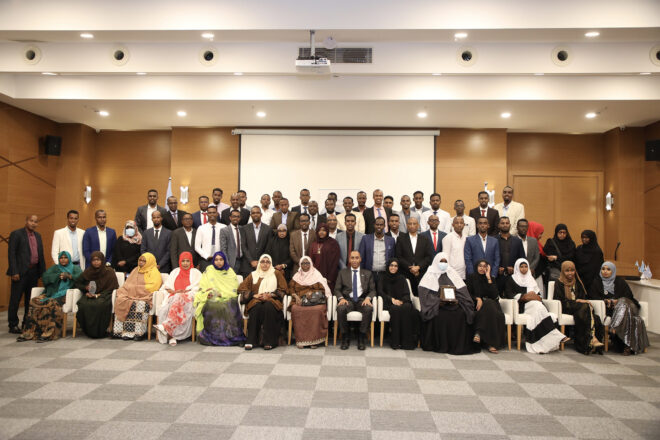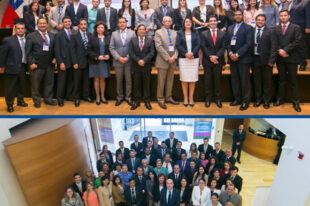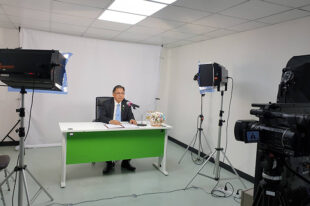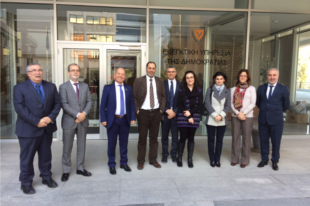
by Mohamed Omer, Public Relations Manager, OAG Somalia; Jostein F. Tellnes, Senior Manager, IDI; and Stephen Emasu, Consultant, Adam Smith International
Many Supreme Audit Institutions (SAIs) in challenging contexts have vast potential for improvements to deliver expected audits, yet capacity development and change often turn out to be difficult. Is it possible for an SAI in such circumstances to make substantial leaps forward in a few years’ time?
In a post-conflict Somalia, strong Auditor General leadership and peer-to-peer cooperation with international partners have been key to improving the performance of the country’s SAI. In the span of about three years, the Office of the Auditor General of the Federal Republic of Somalia (OAGS) has transformed itself into an organization that provides timely, quality audit services and contributes to good governance and service delivery.
International partners have individually and collaboratively supported OAGS in this effort. Through the Royal Norwegian Embassy, the INTOSAI Development Institute (IDI) and Organization of Supreme Audit Institutions of English-speaking African Countries (AFROSAI-E) have been providing support since 2017. The World Bank has supported OAGS as well through its Domestic Revenue Mobilization and Public Financial Management (DRM & PFM) Project. And the European Union has provided Budget Support Technical Assistance and other support through Adam Smith International.
Immense Challenges
In 2017, the Federal Government of Somalia introduced broad economic and institutional reforms to make it eligible for debt relief under the World Bank and International Monetary Fund’s Enhanced Heavily Indebted Poor Country (HIPC) Initiative. This support would allow the country to reintegrate into the global economy for the first time in decades. OAGS was called on at that time to deploy robust accountability frameworks to ensure the government used public resources in an efficient manner.
However, OAGS faced daunting challenges. In late 2017, H.E. Mohamed M. Ali was appointed Auditor General and took the helm of an organization with:
An outdated legal framework. OAGS operated according to mandates set by a 1972 law that made it a Magistrate of Accounts—an arrangement incompatible with International Standards of Supreme Audit Institutions (ISSAIs).
An outdated audit framework. OAGS had low audit coverage and quality, and lacked key audit manuals based on ISSAIs.
Severely limited financial support and staffing. Without an adequate budget or financial support, OAGS had been unable to hire a sufficient number of staff to execute audit mandates in a manner consistent with ISSAIs.
Limited security in a high-risk environment. OAGS works in a very fragile environment in Mogadishu, where physical security cannot be taken for granted. Both staff and advisors on the ground face a range of threats. OAGS conducts security reviews and briefs audit teams on a daily basis, so that they can take safety precautions prior to being dispatched. The briefings contain updates on road closures, explosions, and warnings related to frequently targeted areas, including federal departments and agencies.
Key Steps to Address Challenges
Under the new Auditor General’s leadership, OAGS took immediate steps to address these challenges:
Developing the first ever 4-Year Strategic Plan (2017-2020). The plan identified six Strategic Goals—including production of timely, high-quality audit reports in line with ISSAIs—and over 30 strategic objectives designed to modernize OAGS.
Developing a new audit bill in 2018. In 2012, Somalia’s Transitional Constitution established the principle of an independent OAGS. If enacted, the new audit law would enhance OAGS’s mandate and independence, in line with international best practices and the Westminster model, which is commonly used by many AFROSAI-E members. The bill has been approved by Parliament’s Lower House and is awaiting the signature of the President.
Enlisting the support of the federal government and international community. The Federal Government of Somalia increased its budgetary allocation to OAGS, limited resources permitting. The international community also provided key financial resources, expertise, and logistical support, including refurbishing OAGS’s premises into a modern office.
Enhancing staff capacity to carry out audits using ISSAIs. AFROSAI-E and IDI signed a cooperation agreement to help OAGS build capacity from 2018 to 2020, with funding from the Norwegian government. As part of this effort, IDI and AFROSAI-E trained audit staff and provided hands-on technical support, greatly improving the quality of audit reports. OAGS customized and translated Financial Audit and Compliance Audit manuals, based on ISSAIs, for use by audit staff.
Increasing collaboration. OAGS obtained the support of advisors on the ground to improve the quality of audit reports, raised the visibility of OAGS activities, and enhanced its engagement with stakeholders and collaboration with Somalia’s Federal Member States.
Historic Progress
In 2019, OAGS issued three historic audit reports for the first time: (1) an audit report on the financial statements of the federal government; (2) a consolidated compliance audit report for all security sector entities; and (3) a consolidated compliance audit report for 20 non–security sector entities. The reports can be accessed here.
These reports were a significant achievement for the country and for OAGS, which delivered on its mandate. OAGS submitted the reports to the Parliament and sent copies to the offices of the President and Prime Minster. The reports also attracted significant attention from a public and press increasingly eager to scrutinize the federal government. And in a true historic milestone, AFROSAI-E recognized OAGS for conducting the audits in accordance with ISSAIs.
OAGS issued audit reports again in 2020, a second year of progress. OAGS found that the financial statements of the federal government were much better than the previous year, as the government had made progress complying with the Cash Basis International Public Sector Accounting Standard (IPSAS). Also, the number of federal government entities for which OAGS conducted a compliance audit increased to 35, compared to 25 the previous year. And for the first time, several federal government entities submitted annual financial statements for audit as required by law.
Ingredients for Success
A number of factors have contributed to OAGS’s success:
Becoming a model institution. OAGS strictly adheres to its core values, mission, and mandates. Earning the respect and trust of key stakeholders has been critical to ensuring the smooth discharge of the SAI’s duties. The Auditor General’s strong, high-visibility leadership, engagement with relevant authorities, and decision to publish audit reports since 2019 has enhanced the standing of the SAI.
Management focused on the strategic plan and delivering core audits. Developing the strategic plan was critical, as it guided OAGS through challenges and helped with tracking performance and fostering stronger relationships with key stakeholders. Management and staff showed dedication in ensuring OAGS achieved its goals and objectives. This involved ensuring staff members dedicated their time to the most important ongoing audits. For instance, OAGS decided not to plan any trainings or out-of-country visits in the first half of each year, when the main audit work had to be done.
Nurturing positive communication. Enhancing communication with key stakeholders facilitated cooperation and created an environment in which accountability and transparency frameworks could take hold, increasing audit impact. Annual seminars for all of the main stakeholders in Mogadishu were conducted, including key government entities, Parliament, civil society organizations, elderly representatives, and media. OAGS also engaged in a constructive dialogue with the Accountant General on how to finalize accounts and prepare them for audit.
Creating synergies between partners. In implementing the strategic plan, OAGS has placed great importance on engaging various partners in a productive and transparent manner. OAGS holds semi-annual meetings for all partners, in which it provides updates on progress, challenges, and plans. These meetings ensure openness, trust, and collaboration, and help prevent overlapping efforts. The support of partners has been critical to enabling the evolving institution to gain confidence and strive toward higher goals.
OAGS has taken important steps to strengthen its role in improving the financial management of Somalia’s federal government, and looks forward to continued progress.





